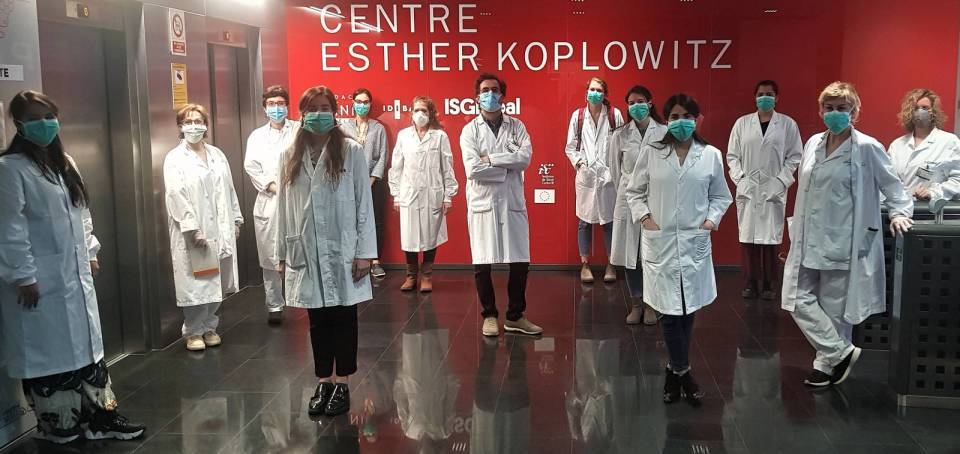Healthcare workers are the pillar of the response to the SARS-CoV-2 pandemic, but at the same time are among those at highest risk of infection.
With the goal of better protecting health professionals, ISGlobal, an institution supported by “la Caixa”, and Hospital Clínic, a referral hospital in Spain and Catalonia for the diagnosis and treatment of COVID-19, have launched two new studies. One will evaluate the efficacy of a preventive treatment among healthcare workersat high risk of infection, and the other will assess the prevalence of SARS-CoV-2 infection among healthcare workers .
PrEP_COVID: pre-exposure treatment for healthcare workers
The first study will assess the use of hydroxychloroquine as preventive treatment against COVID-19 in healthcare workers who are particularly at risk of infection.
“Preventing infection among healthcare workers is crucial for the management of a pandemic such as COVID-19,” explains study coordinator Jose Muñoz, Head of the International Health Service at Hospital Clínic and ISGlobal researcher.
The randomised controlled clinical trial will include 440 health staff from Hospital Clínic. In addition to evaluating the efficacy of hydroxychloroquine as prophylactic treatment, the research team will identify clinical, analytical and microbiological predictors of infection, as well as comparing household transmission between healthcare workers who receive the treatment and those who do not. The study will also establish a repository of blood samples for future research.
Hydroxychloroquine is a drug that has been used to prevent and treat malaria, although it is no longer a first-line treatment for that disease.
SEROCOV1: infection prevalence among healthcare workers
“We currently ignore the seroprevalence of infection, both in healthcare workers and in the general population,” says Alberto García-Basteiro, researcher at ISGlobal and at the Manhiça Health Research Center in Mozambique, and member of the International Travel Service Team at Hospital Clínic. This is precisely what the second study (SEROCOV1), coordinated by García-Basteiro, seeks to discover. By detecting virus-specific antibodies in blood, the research team will evaluate the real prevalence of infection among healthcare workers at Hospital Clínic .
The research team will measure the amounts of different types of virus-specific antibodies in order to detect recent and past SARS-CoV-2 infections, as well as monitoring immune parameters for one year. The team includes researchers from the International Health, Preventive Medicine and Epidemiology, and Occupational Health Services at Hospital Clínic.
Along these lines, the team led by Carlota Dobaño, ISGlobal researcher and expert in malaria immunology, is adapting a technique previously developed by her laboratory. This technique, based on the so-called Luminex technology, has the advantage of measuring different types of antibodies (IgM, IgA, IgG) that recognise different SARS-CoV-2 proteins, from a small blood sample. The strategy could be valuable tool for SEROCOV1 and other studies that need to assess the magnitude and type of immune response against the virus, including future clinical trials with vaccine candidates.
Overall, both studies will contribute to better protection of healthcare workers at risk and to abetter understanding of the epidemiology and transmission dynamics of SARS-CoV-2. The evidence that is generated will guide strategies to prevent COVID-19 at the individual, hospital and community level.
“These studies are the result of an unprecedented collaboration between ISGlobal researchers from different disciplines to accelerate all of the development and implementation aspects of these projects,” says ISGlobal’s Scientific Director, Denise Naniche.
Microfunding Campaign
In addition to the above-mentioned studies, ISGlobal, Hospital Clínic and IDIBAPS are participating in an international clinical trial to test the efficacy of remdesivir (an antiviral drug used for Ebola) as a COVID-19 treatment. That study, which involves 50 centres worldwide, began March 16.
Altogether, ISGlobal is involved in 17 SARS-CoV-2 research projects that are in different stages of development. Most are currently seeking funding. In order to facilitate citizen participation, ISGlobal has created a web form for people to make donations to support these projects:donate.isglobal.org .
Hospital Clínic is running the Coronavirus Response project, which addresses two key aspects of the response to the current pandemic: improving care for COVID-19 patients, and finding new treatments and a cure for the disease.

